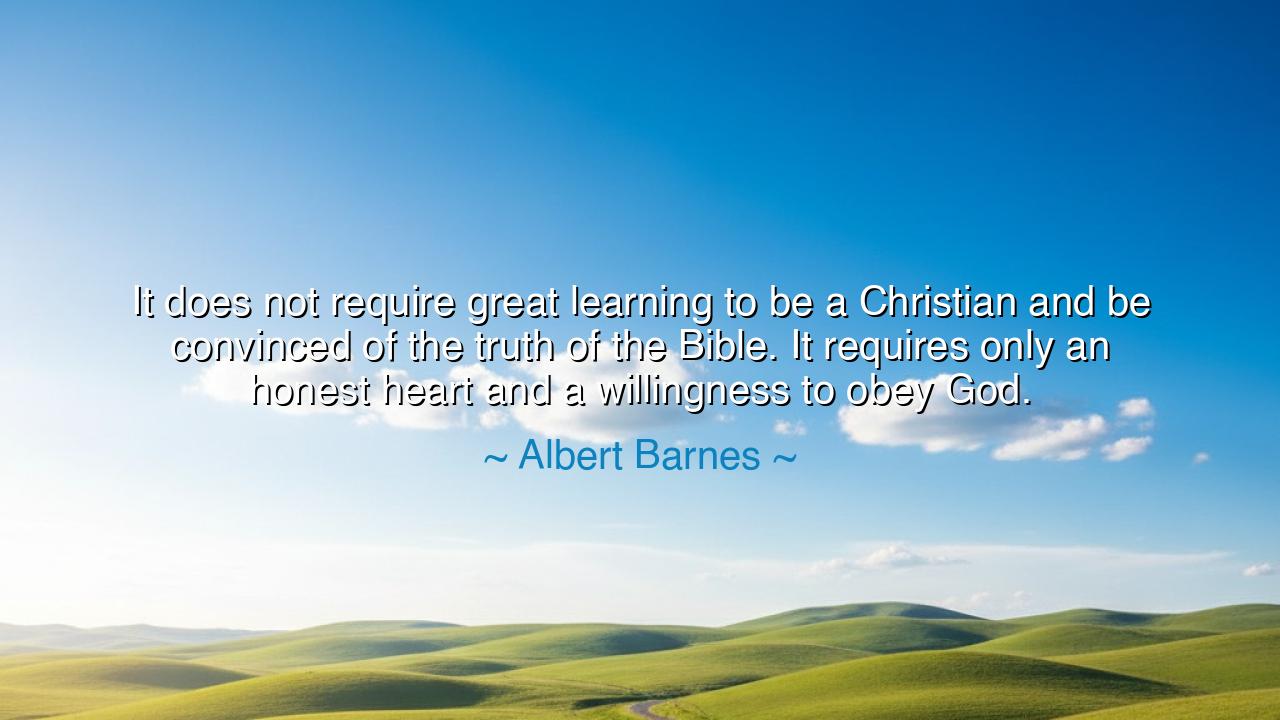
It does not require great learning to be a Christian and be
It does not require great learning to be a Christian and be convinced of the truth of the Bible. It requires only an honest heart and a willingness to obey God.






Hear the words of Albert Barnes, preacher and teacher of the nineteenth century, who declared: “It does not require great learning to be a Christian and be convinced of the truth of the Bible. It requires only an honest heart and a willingness to obey God.” These words are simple, yet they carry the thunder of truth. For in them lies a reminder that faith is not the domain of the scholar alone, nor of the philosopher who twists words into lofty arguments, but of the humble soul who comes with sincerity, honesty, and obedience.
Barnes speaks first of great learning, which many assume to be the pathway to God. In every age, there are those who believe that only the wise, the studied, and the eloquent can grasp the divine. Yet Barnes reminds us that the mysteries of the faith are not hidden behind libraries or cloaked in secret codes. They are revealed to the child, the farmer, the laborer, as clearly as to the scholar. For God does not require brilliance of mind, but purity of heart.
History itself testifies to this truth. Consider the life of the fisherman Peter, who was unlearned by the standards of his age. He had no scrolls of philosophy, no training in the academies. Yet when Christ called him, he followed with an honest heart. And in time, Peter’s words carried the power to shake nations, not because he had studied in halls of wisdom, but because he had yielded to obedience. Here is the living proof of Barnes’s declaration: that faith is not the crown of the learned but the gift of the willing.
So too, recall the story of Joan of Arc, a simple peasant girl with no schooling, who rose to lead armies under the banner of God. She could not write long arguments of theology, but her willingness to obey gave her strength greater than kings. Though mocked by the wise and condemned by the powerful, she walked in the conviction of her faith, and through her courage, a nation was stirred. Her life declares the same truth: that obedience and honesty can do what scholarship alone cannot.
The emotional heart of Barnes’s words is hope. He strips away the fear that one must be brilliant to please God, or that only the eloquent can be convinced of His truth. He offers freedom to the poor, the humble, the ordinary, reminding them that the gates of faith are wide enough for all who seek them. What matters is not the measure of intellect, but the measure of sincerity; not the depth of study, but the depth of obedience.
The lesson, O listener, is this: do not despise your simplicity, nor think that faith is closed to you because you are not learned. Faith requires no gilded tongue nor sharpened intellect—it asks for honesty, humility, and the courage to obey. The proud may stumble in their knowledge, but the humble will walk in light. The Bible opens itself not as a riddle for scholars, but as bread for the hungry and water for the thirsty.
What then shall you do? First, come to God with an honest heart, laying aside pretenses and pride. Second, cultivate willingness to obey, even when obedience is hard, for in obedience lies the strength of faith. Third, honor learning where it serves truth, but never confuse knowledge with holiness. Let your faith be shaped by sincerity, not by pride.
And remember always: as Albert Barnes declared, it does not require great learning to be a Christian. It requires only that you come honestly, and that you live in obedience. Such faith can be carried by the child, the worker, the poor, the forgotten—and in them, as in the wise, the power of God is revealed. This is the gift of the gospel: that none are excluded who seek with honesty and obey with courage.






AAdministratorAdministrator
Welcome, honored guests. Please leave a comment, we will respond soon